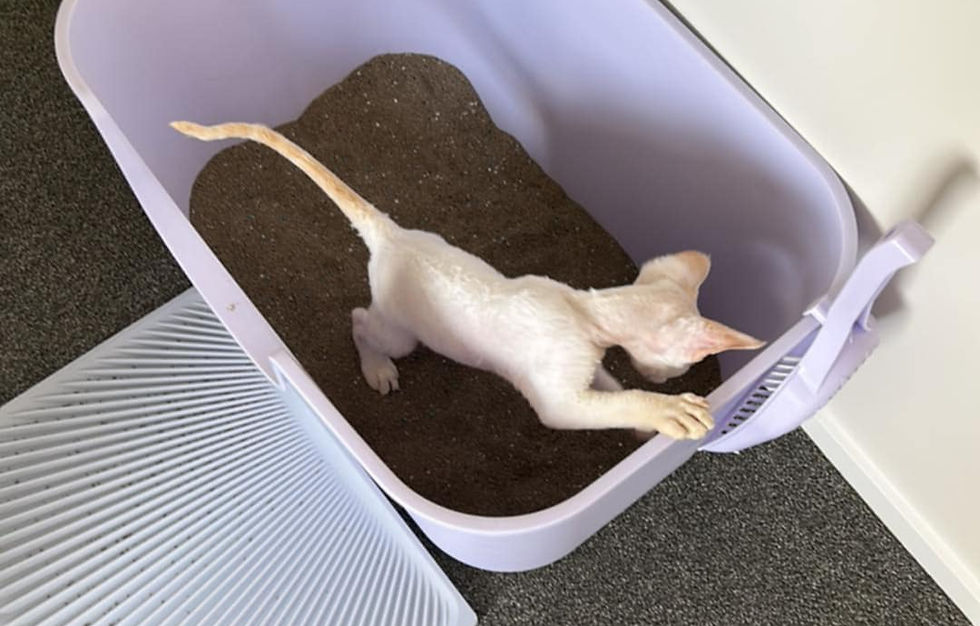Secrets of Litter Box Hygiene
- Alexandra

- Aug 13, 2025
- 5 min read
We know that a happy cat thrives within a happy home, and nothing says (or smells…) ‘fresh’ quite like a clean litter box. A pristine litter box isn't just about keeping your house smelling fresh - it's a cornerstone of your cat's health and happiness. As our Devon's go to indoor homes, providing a litter box is essential, but nobody wants a home that makes them feel smelly. A neglected box can also lead to issues, from your cat seeking alternative "facilities" to actual health problems like urinary tract infections. Monitoring the deposits of your cat is a way to keep in tune with their health, as they are so good at hiding things.
When your kittens were with us, they learned to be precise with their litter box habits. This is because they always had a clean, comfortable place to do their business. Keeping their space tidy is essential for reinforcing those good habits and ensuring a harmonious life for everyone, and preventing opportunists like bacteria, gnats and worms from setting up shop and thriving in the badness.
The thought of scooping might not be glamorous, but trust us, it's one of the most important things you can do for your peace of mind as a cat owner. With a few simple tips and a solid routine, you can make this a stress-free part of your day.
Tip 1: Scoop more than you think
This is my top rule of litter box hygiene. Just like you wouldn't want to use a dirty toilet, your cat feels the same way. Scooping out clumps and solid waste at least once a day prevents odours from building up and makes the litter box a much more inviting place. But nothing beats scooping every time they use the toilet. This is something we often do in the middle of the night, as we can’t stand the smell of cat poop. So if our bed-sharing cat uses the bathroom at midnight, we just get up and scoop it. Every box has an associated mini-bin next to it, and we scoop into the sealed box to eliminate any odour. If you go to work during the day, scoop before you leave and as soon as you get home. This aligns well with a showering schedule, so we always feel like all the nasty jobs are done right before we get clean!

Tip 2: Choose the type of litter that works for you
We want to make you aware of the two types of litter your kitten has been using: pine wood pellets and tofu litter.
Our preferred option is the pine pellet litter, which you can find affordably at Mitre10. We love it because it's great at neutralizing odors and it's completely compostable. We even use the spent litter as mulch in our garden. The only drawback is that it can track sawdust. To manage this, we use a handheld vacuum for daily spot cleaning and a robot vacuum for the stray pieces around the house.
Tofu litter is a good alternative. It clumps, which reduces tracking, making cleanup easier in that regard. However, it's not as effective at controlling odors as the pine pellets. Additionally, even with careful scooping, some clumps can break apart and leave residue, requiring more frequent deep cleaning of the litter boxes.
We've found that the youngest kittens often prefer the texture of tofu litter, so we use it for their initial litter box training before transitioning them to pine pellets. If your cat ever stops using the pine pellets, we recommend offering the tofu litter temporarily to re-establish good habits.

Tip 3: Thoroughly clean the litter trays each week
A complete litter change is crucial for maintaining hygiene, even with daily scooping. The frequency depends on the type of litter you use and how many cats you have, but a good rule of thumb is every one to two weeks. This process involves emptying the entire litter box, cleaning it thoroughly, and refilling it with fresh litter. This practice eliminates bacteria and lingering odors that scooping alone can't address.
At Apokalypt, we completely empty and clean all litter boxes once a week using a bleach solution. We use a ratio of 1 part household bleach to 10 parts water, and it's essential that this solution is mixed fresh on the day of cleaning. Bleach loses its disinfecting power as it oxidizes, so a pre-mixed solution stored for a week won't be effective.
To ensure proper disinfection, follow these steps:
Remove any large clumps or debris from the box. Bleach can't penetrate surfaces covered by mess.
Apply the fresh bleach solution and let the boxes soak for a minimum of 10 minutes. This soaking time is essential for the bleach to adequately disinfect the surface.
By following these steps, you can ensure that you're effectively eliminating bacteria and maintaining a clean environment for your cats.

Tip 4: Location and number of boxes
The spot you choose for the litter box is just as important as how clean it is. Place it in a quiet, accessible area away from their food and water bowls. A cat's a private creature, so a busy hallway or noisy room is not the best choice. A bathroom is a good spot, just don’t forget to leave the door open for 24-7 access!

A good rule of thumb for multi-cat households is to have one litter box per cat, plus one extra. This helps prevent territorial disputes and ensures that there's always a clean option available.
Tip 5: Keep an eye on what's in the box
Regularly checking your kitten's litter box is one of the most effective ways to monitor their well-being. By observing their urine and feces, you can gain valuable insights into their health and quickly spot any potential issues. Pay close attention to the frequency of use, the quantity of waste, and the appearance of their urine and stool.
Changes in color, consistency, or smell can be early indicators of various conditions. For example, a sudden increase in urination could signal diabetes or kidney problems, while small, hard stools might point to constipation or dehydration. The presence of blood in either urine or feces, or any signs of straining, should prompt an immediate call to your vet. While we ensure all our kittens are on a regular worming schedule, it's still a good idea to watch for any signs of intestinal parasites, such as what look like tiny grains of rice in their stool. Being a proactive pet owner by monitoring these details allows you to be an advocate for your kitten's health and seek professional advice when it's most needed.

Taking a few minutes each day to tend to the litter box goes a long way in keeping your cat healthy and your home happy. It's a small act of love that your cat will definitely appreciate. Happy scooping!
- Alexandra



Comments